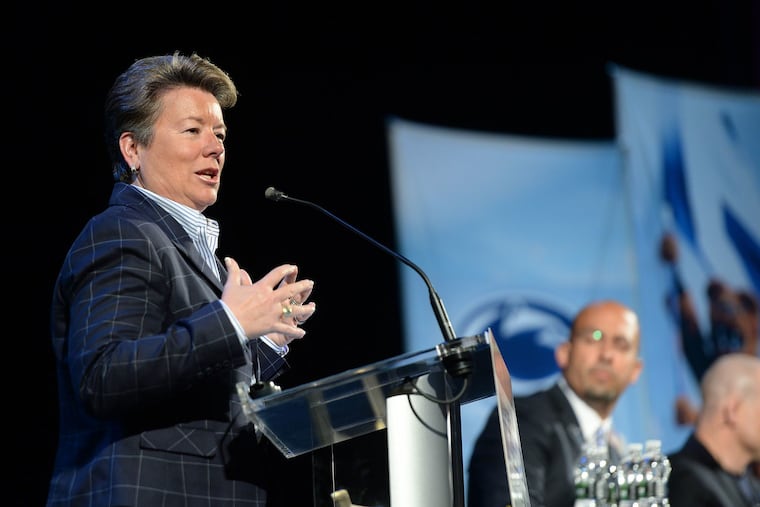Penn State’s Sandy Barbour pleased about the football team’s response to COVID-19
The Nittany Lions were one of two Big Ten teams to play all nine of their scheduled games. Barbour said only one football player tested positive for the coronavirus.

The coronavirus pandemic impacted Penn State’s athletic department in a variety of ways, but the head of the operation was pleased with the way the football program handled its unconventional season.
Sandy Barbour, the university’s vice president of athletics, said Tuesday she was pleased that the Nittany Lions played all nine of their scheduled games, that just one football player tested positive for COVID-19 in the entire season, and the program is on track to have spring practice.
“From a health and safety standpoint, we did really, really well,” she said in a Zoom call with reporters. “We learned that the mitigation protocols, the masking, the social distancing, the not-gathering, that stuff works. Those were the sacrifices that the young men in our football program made to have a full season, and to be one of only two teams in the Big Ten to get all of their games in.
“We learned what you can get done in a Zoom meeting from a sports standpoint and what you can’t. There was a lot that we’re looking to from an event standpoint that we learned. Thank goodness we got a football season. And thank goodness that we had an opportunity to learn a lot from probably our largest and most complex sports that could then be applied to others.”
The 2020 Lions of head coach James Franklin came back from a 0-5 start, which Barbour called “challenging and disturbing,” to win their last four games.
“We also have to remember the context of which it was in,” she said. “Ultimately, everyone was going through that. Certainly, the start was concerning, but I think James and his staff found a lot of answers. I think what we saw in the back half of the season was way more indicative of our program.”
» READ MORE: James Franklin believes a new offensive coordinator can energize the Penn State offense
Barbour said she feels the football team, which was not able to conduct spring practice last year after the pandemic struck, would be able to go through a traditional spring practice this year “unless conditions were to change for the worse.” She added that it was too early to decide whether to bring back the Blue-White intrasquad game.
She said there were COVID-19 challenges when teams first came back for the fall semester, and again at the beginning of January. She said all 30 of the university’s athletic programs are currently practicing, with fall sports having been moved to the spring semester. The 31st program — football — is in winter workouts.
Barbour credited Franklin, and the example he exhibited in wearing his mask the proper way, for keeping the football program’s coronavirus tally to just one positive test, which she said was contracted outside of football.
“It’s no coincidence that we only had one positive in football during the season,” she said. “It was because James led the way, James modeled the behavior, James held them accountable, and the guys all bought in. In my mind, he made a statement about how important health and safety is, and how important following the rules are.”
» READ MORE: Penn State safety Lamont Wade declares for the NFL draft
As for her department’s financial picture, Barbour said that with the ability to access television revenue and tap into some reserve funds, the loss will come in “somewhere between 20 and 25 million dollars.” She said earlier in the pandemic, not knowing if football would be played, that the department was looking at $60 million to $90 million in losses.
“Our donors and our community have been phenomenal as it relates to helping us at this difficult time,” she said. “There have been a lot of sacrifices, both individual and organizational sacrifices. Our employees have taken pay cuts. We’ve had a small number of furloughs. We’ve held positions open. We’ve reduced our expenses by somewhere north of $25 million.”
Although three Big Ten member schools, Iowa, Minnesota, and Michigan State, have cut athletic programs, Barbour said such a move at Penn State is “not something I’m interested in.
“We’ve got a very proud tradition and legacy of a large, robust program, and that’s not something that we’re looking at,” she said.